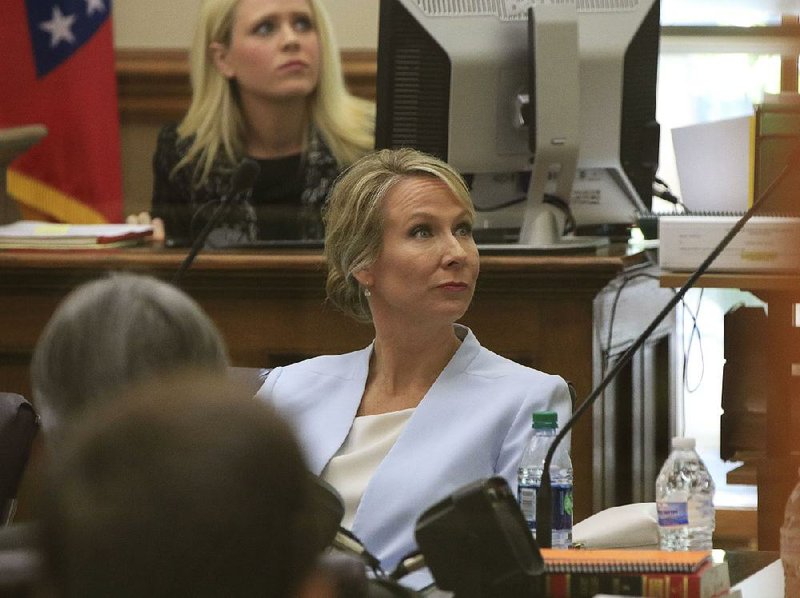Supreme Court Justice Courtney Goodson testified in open court Wednesday that she voted against a request for a pay increase last year, a rebuff of attack ads run against the justice in her re-election campaign.
The attacks, made by the Republican State Leadership Committee in a recent mailer, accuse Goodson of requesting an $18,000 pay raise.
The raise was in fact requested by Chief Justice Dan Kemp, on behalf of the entire court. (Only a smaller raise was actually approved and given to the justices.)
Prior to Wednesday, Goodson had declined to say whether she supported the request for a raise, citing the anonymity of the vote taken by her and her colleagues.
But in response to the mailer — and other claims about Goodson made by the committee in television attack ads — Goodson filed a defamation case against the group, hoping for an injunction to stop them from airing the ads.
On Wednesday, she took the stand in Little Rock’s federal courthouse during a hearing over her lawsuit, and said that she was one of two justices who voted against requesting the raise. She declined to say which other justice joined her.
Goodson told reporters afterward that she had not discussed her decision to take the stand with her colleagues.
“I put [the court’s] interest in front of mine,” Goodson said of her decision not to reveal her vote sooner.
The Republican State Leadership Committee’s attorneys argued in court that the ads, which also raise questions about Goodson’s impartiality and expensive gifts she has received, are true. The group has purchased hundreds of thousands of dollars worth of TV air time with ads mentioning the gifts Goodson received, but not the court’s pay raise.
John Tull, a Little Rock attorney who is representing the Washington, D.C.-based RSLC, declined to comment following the hearing.
A spokesman for the RSLC said Wednesday that the group had already completed its mail campaign, and had no other plans to distribute the mail ads.
"Courtney Goodson had plenty of opportunity to explain her vote before today,” the RSLC spokesman, David James, said in an email. "She certainly didn’t deny the other claims in the ad, including the $50,000 gift she received from a campaign donor."
During the more than four-hour court hearing, Tull argued that Goodson was seeking an prior restraint on free speech, and that she failed to meet the heavy burden set by U.S. Supreme Court decisions to do so. Tull also presented evidence that he said would show the other claims made by the RSLC — namely that Goodson’s donors and gift-givers had benefited from her decisions — were not false.
That included Goodson’s own statement of financial interests showing that she had gone on the expensive trips paid for by friends and donors, as the ads criticize her for doing. On the stand, Goodson repeated what has been her previous defense: that she recused from cases directly involving people who gave her gifts, including her husband John Goodson and friend WH Taylor.
But Tull said that the ads merely implied that Goodson favored her donors, and pointed to decisions she joined that were generally perceived to favor trial attorneys. And on cross-examination, Goodson conceded that other pieces of bad press may have impacted voters’ impressions of her.
“Up to this point, there has been no false statement,” Tull said. “It is the highest possible standard to try to have a prior removal [of the ads] in this case."
U.S. District Court Judge Brian Miller said he would consider the information presented by both sides, and decide by late today or Thursday morning whether to allow the ads to continue.
Miller, however, at times seemed skeptical that he could legally block the ads.
“I don’t know if they don’t have the right to just sit here and bash the heck out of her,” Miller said.
Goodson is running for re-election against Department of Human Services Attorney David Sterling, who has denied any involvement with the ad campaign.
